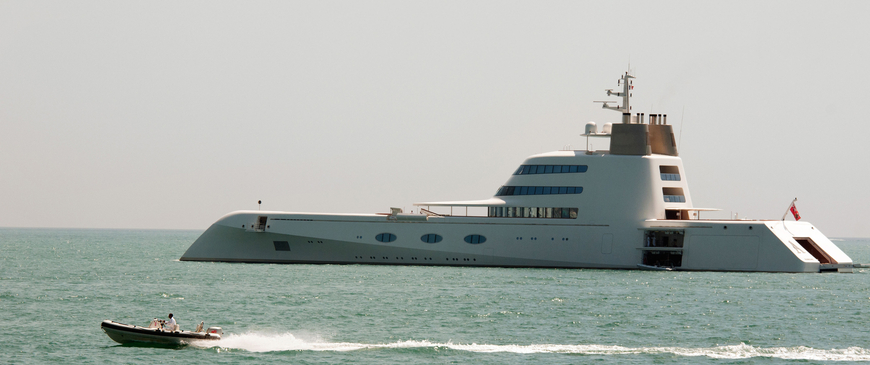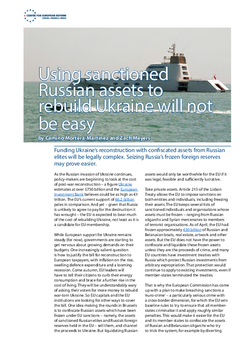
Using sanctioned Russian assets to rebuild Ukraine will not be easy
Funding Ukraine’s reconstruction with confiscated assets from Russian elites will be legally complex. Seizing Russia’s frozen foreign reserves may prove easier.
As the Russian invasion of Ukraine continues, policy-makers are beginning to look at the cost of post-war reconstruction – a figure Ukraine estimates at over $750 billion and the European Investment Bank believes could be as high as €1 trillion. The EU’s current support of €6.2 billion pales in comparison. And yet – given that Russia is unlikely to agree to pay for the destruction it has wrought – the EU is expected to bear much of the cost of rebuilding Ukraine, not least as it is a candidate for EU membership.
While European support for Ukraine remains steady (for now), governments are starting to get nervous about growing demands on their budgets. One increasingly salient question is how to justify the bill for reconstruction to European taxpayers, with inflation on the rise, swelling defence expenditure and a looming recession. Come autumn, EU leaders will have to tell their citizens to curb their energy consumption and brace for a further rise in the cost of living. They will be understandably wary of asking their voters for more money to rebuild war-torn Ukraine. So EU capitals and the EU institutions are looking for other ways to cover the bill. One idea making the rounds in Brussels is to confiscate Russian assets which have been frozen under EU sanctions – namely, the assets of sanctioned Russian elites and Russia’s foreign reserves held in the EU – sell them, and channel the proceeds to Ukraine. But liquidating Russian assets would only be worthwhile for the EU if it was legal, feasible and sufficiently lucrative.
Take private assets. Article 215 of the Lisbon Treaty allows the EU to impose sanctions on both entities and individuals, including freezing their assets. The EU keeps several lists of sanctioned individuals and organisations whose assets must be frozen – ranging from Russian oligarchs and Syrian mercenaries to members of terrorist organisations. As of April, the EU had frozen approximately €30 billion of Russian and Belarusian boats, real estate, artwork and other assets. But the EU does not have the power to confiscate and liquidate these frozen assets unless they are the proceeds of crime, and many EU countries have investment treaties with Russia which protect Russian investments from arbitrary expropriation. That protection would continue to apply to existing investments, even if member-states terminated the treaties.
That is why the European Commission has come up with a plan to make breaching sanctions a ‘euro-crime’ – a particularly serious crime with a cross-border dimension, for which the EU sets baseline rules to try to ensure that all member-states criminalise it and apply roughly similar penalties. This would make it easier for the EU and its member-states to confiscate the assets of Russian and Belarusian oligarchs who try to trick the system, for example by diverting or moving assets from one member-state to another. The Commission’s plan is ambitious: at present, only 12 member-states consider the violation of sanctions as a criminal offence. In two EU countries (Spain and Slovakia), breaching sanctions is only an administrative offence. In some member-states, a sanctioned individual who fails to abide by EU restrictive measures can face up to 12 years in jail; in others, they would be able to walk away with a €1,200 fine.
Even if the Commission succeeds in convincing all member-states to start confiscating private Russian and Belarusian assets, it will still be very difficult to use those assets for Ukraine’s reconstruction. Because asset-seizing requires unlawful conduct (and not merely an association with Vladimir Putin) confiscation will often require criminal proceedings. The process of expropriating sanctioned private assets will therefore be painstaking and open to legal challenges in many member-states. National prosecutors will need to present evidence of either sanctions breaches or that the assets were the proceeds of crime, and in many cases this will be impossible to prove. Some member-states, like Germany, would need to change their constitutions to allow for confiscated private assets to be used in rebuilding Ukraine. Even if all legal hurdles were crossed, confiscating the assets of Putin’s elite would still be a fraught process and – since only a fraction of the €30 billion in frozen assets will probably be seized – insufficiently lucrative to make much of a dent in Ukraine’s reconstruction bill.
Confiscating the assets of Putin’s elite would be a fraught process – and insufficiently lucrative to make much of a dent in Ukraine’s reconstruction bill.
Russia’s foreign reserves are a much bigger prize – the value of reserves frozen by the West is approximately €300 billion – and it may be easier to use them for Ukraine’s reconstruction. International law protects foreign reserves to some degree, but there are precedents for freezing another country’s foreign reserves in specific cases, as for example when the US stopped the Taliban accessing Afghanistan’s foreign reserves last year. When foreign reserves are frozen, governments and private entities are banned from buying or dealing with them, but the reserves themselves are left untouched. Confiscation, on the other hand, goes a significant step further.
If Europe seized Russia’s foreign reserves, it would want at least a plausible justification under international law for taking this further step. It could, for example, try to present confiscation as a counter-measure intended to persuade Moscow to withdraw from any parts of Ukraine it still occupies and compensate for its damage. Europe could also argue seizures have at least some precedent, even if they are not directly analogous: for example, in 2003, the US confiscated Iraq’s foreign reserves to help with rebuilding the country once Saddam Hussein was defeated. Seizing Moscow’s foreign reserves would appear most legitimate if an international tribunal like the International Court of Justice awarded reparations to Ukraine and Putin refused to pay – but if that happens, it would probably be many years in the future.
Assuming these legal complexities could be overcome, seizing Russia’s foreign reserves could be faster and far more lucrative than trying to liquidate private assets of the Kremlin elite. However, two problems would remain. First, expanding the circumstances when assets or reserves can be expropriated risks encouraging other countries, including those with fewer moral scruples about property rights, to confiscate others' assets. This could put European investments in other parts of the world at greater risk. Second, Europe needs to be careful not to be seen as blatantly disregarding the rule of law and principles of international law. Most Europeans may, by now, have seen through Putin’s lies, but this is not necessarily the case elsewhere. Many developing countries are still receptive to Moscow’s propaganda – and particularly to the idea that the West has forced Russia to invade Ukraine, and that Europe’s sanctions are to blame for the higher food and energy prices and the shortages they are suffering.
If the legal complexities could be overcome, seizing Russia’s foreign reserves could be faster and far more lucrative than trying to liquidate private assets of the Kremlin elite.
European governments would increase the risk of alienating countries susceptible to Russian and Chinese influence if they chose to use Moscow’s foreign reserves to rebuild Ukraine without a watertight legal argument (like an international court ruling) to do so. If Europe chose to confiscate Russia’s foreign reserves, at a minimum, it would need to lay out clear and predictable principles, to try to assure other countries that their own foreign reserves would only ever be seized in response to similarly severe breaches of international norms.
Russian assets will not suffice to pay for the entirety of Ukraine’s reconstruction. Confiscation will be slow and, at times, legally problematic. While they consider whether and how to liquidate sanctioned Russian assets, European leaders should also come up with a narrative to explain to European taxpayers why it is in their long-term interest to help finance Ukraine’s reconstruction.
Camino Mortera-Martinez is head of the Brussels office and Zach Meyers is a senior research fellow at the Centre for European Reform.

